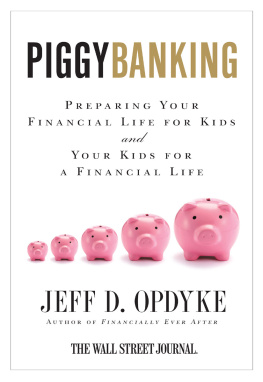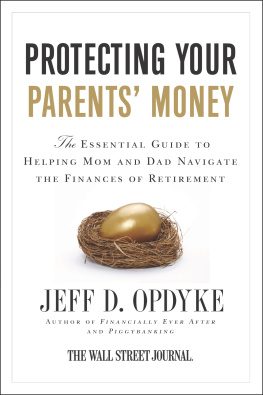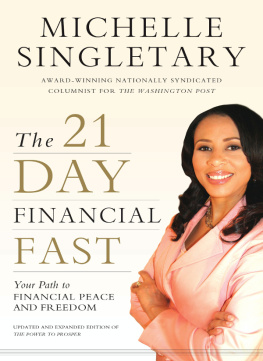Youve made all my successes possible.
I love you more than you know.
Its a simple calculus, kids and money: From birth until college graduation, children consume dollars like theyre chicken nuggets.
For those of us who arent independently wealthy, that puts unrelenting pressure on the family pocketbook. The financial demands of raising a child require that money you otherwise might use to prepare for retirement, or to save for a nicer house, a sportier car or a swankier vacation, must, out of necessity, be earmarked for Lego sets and pediatric visits and school uniforms and Christmas toys and a college savings account and a minivan and a trip to Disneylandand lots of, well, chicken nuggets. Im not saying this to disparage kids. I have two of my own, and money is nothing in comparison to the happiness they bring me and my wife. Yet happiness does not negate the fact that the moment a child arrivesand, actually, many months before the arrivalyour role as an adult changes in dramatic, profound ways. So, too, does your familys financial life.
Not only are you now on the hook for tens of thousands of dollars in costs over the next two decades, but you also have a new obligation to teach your children about money so that they grow into adults who are at home in the financial world and who have a healthy relationship with money. That might sound odda healthy relationship with moneybut too many adults dont understand money and are so intimidated by finance that they routinely make a hash out of their personal financial lives. You, the parent, are the first and most crucial link in the learning process. Think about it: If you dont understand money or how to teach it to your children, how will they learn?
Thus, this book picks up where the first book in this series, Financially Ever After , left off. Where Financially Ever After laid the groundwork for couples learning to manage money and the money fights that inevitably arise, this book takes over when kids arrive. This is the parents guide to the finances of childhood, both the monetary impacts on the pocketbook and the financial lessons that parents seek to impart through the years to their kids.
The first chapter is devoted singularly to preparing financially for a babys arrival, and, for those parents who want Mom or Dad to stay at home with the kids, how to think about ways to make a one-income lifestyle work.
The remaining chapters are aimed at the financial lessons kids need to learn so that they have a solid grasp on money by the time they leave home and live their own lives. The chapters are split into natural divisions that track moneys major categories: earning, spending, saving, investing, giving. Theres also a final chapter titled Learning that covers the basics of what you need to know to save for and ultimately afford college costs for your child.
Why, you might wonder, is this book even necessary? Money, after all, is a seemingly simple technology. Youve been spending it yourself since you were a kid, and youve been earning it at least a few years. What more is there to know about it, really? And what more do you really need to teach your kids that you dont already know yourself? Well, if statistics are any indicator, a lot.
In measuring how well twelfth graders understand the basics of personal finance, the nonprofit Jump$tart Coalition for Personal Financial Literacy found that a measly 10% could satisfactorily answer questions about personal finance. Many had no clue how to balance a checkbook. Overall, about half the students failed a test on basic personal-finance literacy.
Yet life as an adult clearly requires knowledge of personal finance. That doesnt mean kids need an MBA in security analysis or that you need to hire a financial advisor to tutor your preschooler. But kids obviously need better information to more effectively manage their own financial resources one day.
And that begins with Mom and Dad.
But parents are thinking about kids and money long before the day that they begin teaching their child about finances; the very idea of conception itself comes wrapped in one of the toughest questions couples grapple with: Can we even afford to have a baby?
I know many couples debate that question for years, continually putting off children until they feel they can afford it. Some never reach that point mentally because they never believe their finances are capable of handling the costs. Others end up pregnant unexpectedly and ultimately realize that the true answer to the question, Can we afford to have a baby? isnt really about affordability in the first place. Its about maturity, about moving past those dreams of material goods like the houses, cars and vacations you want and picking up in the trade-off the purest form of love and devotion you will ever know.
I learned this myself on October 12, 1996, a Saturday, at 7:47 A.M ., when my first child, my son, popped into the world. For the nine months prior to that I was all but paralyzed by a generalized fear that my wife and I were simply ill-prepared for the financial obligations inherent in parenthood. Yes, we both had stable, secure jobs. We had a house and two cars that we could afford. We never went hungry, and we had the discretionary income that allowed us to eat out whenever the hunger pangs hit. We could afford some of lifes niceties. In short, we werent financially strapped. But that didnt change the fact that when my wife announced her pregnancy, my financial worries ballooned. And, given that I write about personal finance for a living, I worried about everything financial. Whats this going to do to our budget? What wont we be able to afford? Do I need to start a college savings account now? Oh my Godcollege! How are we ever going to pay for that? And braces? And the doctor bills? How much is day care going to cost, and what do I have to cut from the budget to afford that? Do we need a bigger house? A safer car? And the questions kept on coming. Do you realize how much money were going to pay just for diapers? I quizzed my wife with grave concern.
In truth, theres never a perfect time financially to have a baby. Couples who fall into the We cant afford a baby now trap typically find selfish motivations underneath if theyre willing to examine their root concerns. They know a child will change their lifestyle and they dont want thator, at least, one partner doesnt want that, fueling one of the most profound disagreements that can arise in a relationship. Theres nothing necessarily wrong with such feelings. But if youre honest with yourself and your spouse about your real motivations, you will often come to realize that the money is just an excuse.
If I can tell you anything here, at the start of this book, its this: The love you feel for your child, and the adoration that child expresses toward you, is worth every vacation you postpone, every restaurant meal you skip, every new sports car you never buy. Even the overused word priceless doesnt begin to capture the depth of the true affection you will feel. Soget over the money worries already.
Yes, your kid is going to put a big dent in your pocketbook. Yes, youre going to have to make sacrifices and hard decisions about spending and saving. Youre going to have to do a better job of budgeting and learning to invest for your childs future. And youre going to have to teach your kids about all these same financial fundamentals so that they grow into adults who are confident about their own money skills.
The journey, though, is worth it.
So, lets begin





